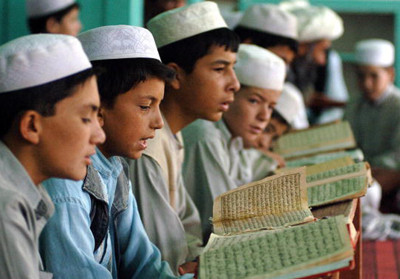By Taha Siddiqui
Outside Peshawar’s mosques, after Friday prayers, magazines with articles and pictures of attacks by the Afghan Taliban and violence carried out by Nato forces are distributed, most of the time for free. The magazines are usually accompanied by guidance on Shariah law.
These magazines are available in a number of languages including Urdu, English, Farsi and Dari, reaching out to a wide-ranging audience. One such magazine in Urdu, called Nawaa-e-Afghan Jihad, published last month, has pictures of an attack in June on a hotel in Kabul.
Part of the caption below it reads:
“The Islamic Emirate’s “Fidayeen” attacked a hotel on 22nd June, 2012 in the Green Zone of Kabul killing 25 crusaders and 9 Afghan officials. Along with this, dozens of security personnel were also doomed to hell.”
Although in Pakistan such literature has gone under the radar due to a crackdown by law enforcement agencies, in Afghanistan, this material continues to flourish in provinces along the border including Kunar and Khost, according to locals from these areas.

Afghan boys read the Quran at the Abdullah ebni-Abas madrassa school in Ghazni province. (Photo: Shah Marai/AFP-Getty Images)
Near the historic Qissa Khwaani Bazaar in Peshawar is a printing press market aptly called “Mohalla Jangi,” which means the “Neighbourhood of War”. A narrow lane leads inside to around 2,000 printing presses, busy churning out paper printed with whatever has been ordered by the customer.
Ostensibly, the shops here print school books, government publications and promotion material for the development sector, the majority of which is distributed in Afghanistan. But behind closed doors, the industry here also caters to Afghan jihad literature.
Umer, who has run a business here for the last 15 years, says Taliban literature gets printed regularly from his market. “For those who take such orders, it’s just business. Times are bad and some printers need the money,” Umer adds.
Most of his clients are also from Afghanistan, but Umer claims he only takes orders from the development sector. “Those two buildings over there, they have printing presses in them,” says Umer, pointing to a building nearby that looks like a residential complex. “They have tried to hide what they are printing by not having the machines out in the open. But here at the market we all know some of the jihadi magazines originate from here,” he claims.
Just last month, one of the printers from this market was picked up by law enforcers on suspicion of printing Pro-Taliban material. Although he has returned, he refuses to meet with the press and has not come to the market since he was freed.
Another printer, Murad, says around four to five of the businessmen here take orders from the Afghan Taliban. “Peshawar is the first choice for anyone coming from Afghanistan. But now with police harassment of Afghans increasing in Peshawar, most head to Lahore, where the local police cannot distinguish between them and Pashtuns from Pakistan,” Murad adds.
Murad and Umer both know who are behind such literature, and even though they don’t like it, they don’t complain. “The Pashtun community is based on the system of revenge and if I complain against someone, their family may come after me or my family,” Umer confides.
Meanwhile, the union representative of the area, Niaz Ahmad, justifies the printing of such material. “Who are the Taliban? They are the defenders of Islam and they follow the true Islamic Shariah. What’s wrong with what they do?” Ahmad asks.
According to Muhammad Shafiq, a media consultant based in Peshawar who frequently visits Afghanistan, “People here in Pakistan and in Afghanistan already have a lot of anti-American sentiment. Such literature reinforces those beliefs and helps Taliban get recruits and funding.”



